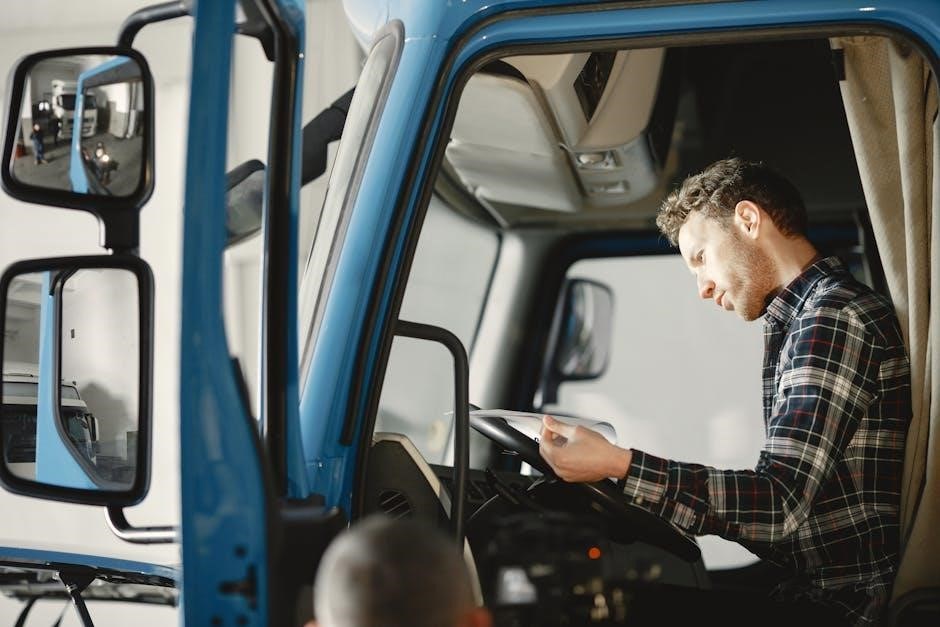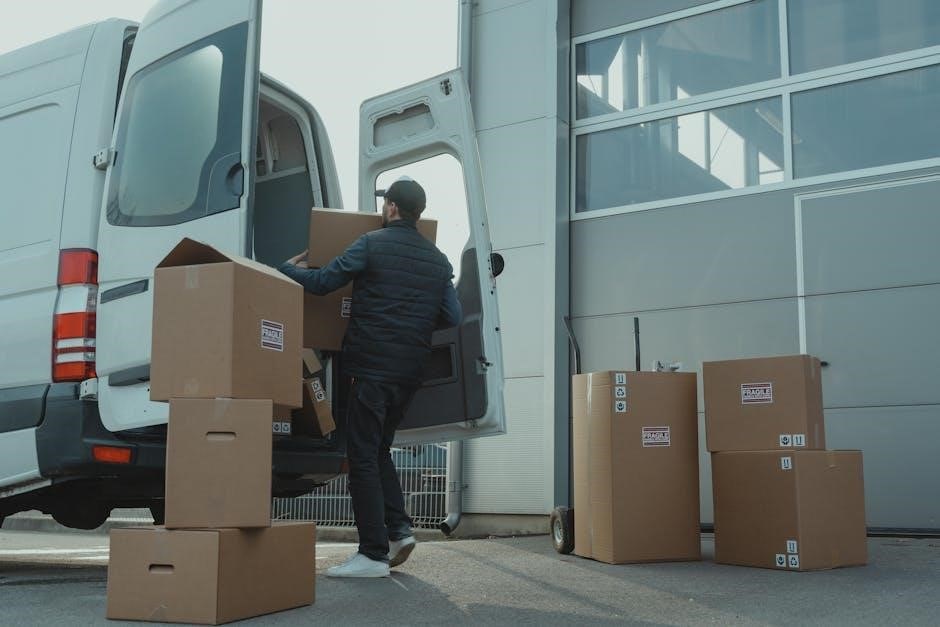Welcome to the Arizona Commercial Driver License (CDL) Manual, published by the Arizona Department of Transportation. This guide provides essential information on commercial driving laws, safety practices, and testing requirements to help you prepare for your CDL and drive safely in Arizona.
Overview of the Arizona CDL Manual
The Arizona CDL Manual is a comprehensive guide designed to help commercial drivers understand state and federal regulations. It covers essential topics such as license classifications, safety practices, and testing requirements. The manual is divided into sections, including medical certification, vehicle inspection, and endorsements. It serves as a primary resource for preparing for the CDL exam and ensuring safe and lawful operation of commercial vehicles in Arizona.
Importance of the Manual for Commercial Drivers
The Arizona CDL Manual is crucial for commercial drivers as it outlines state and federal regulations, ensuring compliance and safety. It provides detailed information on licensing requirements, road safety, and operational standards. By studying the manual, drivers can prepare for exams, understand legal obligations, and develop safe driving habits, which are essential for protecting themselves, passengers, and other road users.

Eligibility Criteria for Obtaining an Arizona CDL
To qualify for an Arizona CDL, applicants must meet legal age, residency, and citizenship requirements, pass medical exams, and maintain a clean driving record.
Age Requirements for CDL Applicants
In Arizona, CDL applicants must be at least 21 years old to apply for an interstate CDL, while intrastate CDL applicants can be 18 years old. Federal regulations require CDL holders to be 21 or older for interstate commerce. Applicants under 21 cannot operate commercial vehicles across state lines but may qualify for intrastate driving with proper documentation. Ensure compliance with these age requirements before submitting your application.
Residency and Citizenship Requirements
Arizona CDL applicants must provide proof of legal U.S. residency and citizenship. Valid documents include a birth certificate, passport, or green card. Applicants must also demonstrate Arizona residency with documents like a utility bill or lease agreement. Ensure all documents are current and valid to meet the Motor Vehicle Division’s requirements for processing your CDL application successfully.

Classification of Commercial Driver Licenses in Arizona
Arizona classifies CDLs into three types: Class A, B, and C, each requiring specific qualifications and authorizing operation of different commercial vehicles based on weight and use.
Types of CDLs (Class A, B, and C)
A Class A CDL is required for combination vehicles with a GVWR of 26,011 lbs. or more, towing a trailer over 10,000 lbs. Class B CDL applies to heavy straight trucks with a GVWR of 26,011 lbs. or more. Class C CDL is for smaller passenger vehicles or hazardous material transport. Each class specifies the type of commercial vehicle you are authorized to operate, ensuring safe and regulated driving practices in Arizona.
Endorsements and Restrictions Explained
Endorsements on an Arizona CDL indicate specialized qualifications, such as transporting hazardous materials or operating tank vehicles. Restrictions limit driving privileges, like prohibiting the operation of air brakes or certain vehicle types. Both are critical for ensuring drivers operate within their capabilities and meet federal and state safety standards. They are determined during the application and testing process to maintain road safety and compliance with regulations.

The Application Process for an Arizona CDL
The Arizona CDL application process involves submitting required documents, completing a vision test, and passing knowledge and skills tests. Ensure eligibility and prepare accordingly.
Step-by-Step Guide to Applying for a CDL
- Review eligibility criteria and ensure you meet age, residency, and medical requirements.
- Complete and submit the CDL application form along with required documents.
- Pass a vision test and obtain a Commercial Learner Permit (CLP) by clearing the necessary knowledge exams.
- Schedule and pass the skills test, which includes pre-trip inspection, basic vehicle control, and on-road driving evaluation.
- Pay the applicable fees and receive your Arizona CDL upon successful completion of all requirements.
Study the Arizona CDL Manual thoroughly to prepare for exams and ensure compliance with state regulations.
Required Documents and Forms
To apply for an Arizona CDL, you must provide specific documents. These include proof of identity, residency, and citizenship, such as a valid passport or birth certificate. Additionally, you’ll need a completed CDL application form and a medical certification form. Endorsements may require extra documentation. Ensure all forms are signed and submitted as per Arizona Department of Transportation (ADOT) guidelines. Check the ADOT website for the most current document list.

Testing Methodology for Arizona CDL
The Arizona CDL testing includes written knowledge tests and practical skills assessments. Exams cover traffic laws, safety practices, and specific endorsements. Road tests evaluate driving competence and adherence to regulations, ensuring safe and lawful operation of commercial vehicles.
Written Knowledge Tests
The Arizona CDL written knowledge tests assess understanding of traffic laws, safety practices, and vehicle inspection procedures. Multiple-choice questions cover general knowledge, endorsements, and specific license types. Applicants must pass these tests to qualify for a Commercial Learner Permit (CLP). The exams are based on the Arizona CDL Manual, ensuring drivers are well-prepared for safe and lawful operation of commercial vehicles.
Skills and Road Test Requirements
The Arizona CDL road test evaluates driving skills and safety practices. Applicants must demonstrate proficiency in vehicle control, braking, and maneuvering. Tests are conducted in a commercial vehicle appropriate for the license class. Examiners assess adherence to traffic laws and safe driving habits. Successful completion is required to obtain a CDL. Practice and thorough preparation using the Arizona CDL Manual are recommended to ensure readiness for the road test.

Endorsements and Specialized Licenses
Arizona offers endorsements for specialized licenses, such as HazMat, passenger, and school bus certifications. These require additional testing and are optional based on career needs.
Hazardous Materials (HazMat) Endorsement
The HazMat endorsement allows drivers to transport hazardous materials. It requires a background check by the Transportation Security Administration (TSA) and a written test. This endorsement is mandatory for drivers handling hazardous cargo, ensuring public safety and compliance with federal regulations. It is a critical certification for those in industries involving chemical or hazardous material transport.
Passenger and School Bus Endorsements
Passenger and School Bus endorsements are required for drivers transporting 16 or more people, including the driver. These endorsements ensure safe operation of buses and passenger vehicles. School bus drivers must pass rigorous background checks, while passenger endorsements require specific knowledge of passenger safety and vehicle handling. Both involve additional testing beyond the standard CDL to ensure public safety and compliance with federal and state regulations.

Fees and Costs Associated with Arizona CDL
The Arizona CDL application, testing, and endorsement fees vary based on license type and endorsements. Costs include initial application fees, skills testing fees, and endorsement-specific charges.
Breakdown of CDL Application and Testing Fees
The Arizona CDL application and testing fees are structured to cover various components. The initial application fee is required for processing. Separate fees apply for written knowledge tests and skills tests, which include pre-trip inspections, basic vehicle control, and on-road driving. Endorsements may incur additional charges. Fees vary based on the class of license and specific endorsements. It’s advisable to check the official ADOT MVD website for the most accurate and updated fee schedule.
Cost of Endorsements and Additional Services
The Arizona CDL endorsements and additional services incur specific costs. HazMat, Passenger, and School Bus endorsements each have unique fees. Additional fees apply for services like license upgrades or duplicate issuance. Costs vary based on the endorsement type and service required. It’s important to consult the ADOT MVD website for the latest fee breakdown to ensure accurate planning.
Disqualifications and Penalties for CDL Holders
CDL holders face disqualifications for serious traffic violations, including DUIs, reckless driving, and speeding. Penalties may include license suspension, fines, and mandatory training to reinstate privileges.
Violations Leading to CDL Disqualification
CDL disqualification occurs due to severe violations, including DUIs, reckless driving, and speeding. Other offenses like improper lane changes or following too closely can also lead to suspension. Repeat violations escalate penalties, with mandatory fines and potential license revocation. Hazardous materials endorsements face stricter scrutiny, and convictions for drug or alcohol use result in immediate disqualification. Understanding these violations is crucial for maintaining CDL privileges in Arizona.
Consequences of Traffic Violations
Traffic violations can lead to fines, license suspension, or disqualification. Severe offenses, such as reckless driving or DUI, result in mandatory penalties. Commercial drivers face stricter scrutiny, with violations impacting their CDL status. Accumulating too many points can lead to license suspension, affecting livelihoods. Understanding these consequences ensures compliance with Arizona traffic laws and maintains safe driving practices for commercial vehicle operators.
Medical Requirements for Arizona CDL Holders
CDL holders must meet Federal Motor Carrier Safety Administration (FMCSA) medical standards. A certified Medical Examiner’s Certificate is required. Regular recertification ensures driver fitness and compliance.
Medical Certification Process
The medical certification process for Arizona CDL holders involves completing a physical examination by an FMCSA-certified Medical Examiner. Drivers must provide detailed medical history, undergo vision and hearing tests, and meet specific health standards. Upon passing, they receive a Medical Examiner’s Certificate, which must be submitted to the Arizona Department of Transportation. Regular recertification is required to maintain CDL eligibility and ensure ongoing fitness for duty.
Substance Abuse and Alcohol Testing Policies
Arizona enforces strict substance abuse and alcohol testing policies for CDL holders. Commercial drivers are prohibited from operating vehicles with a blood alcohol concentration (BAC) of 0.04% or higher. Random, pre-employment, post-accident, and reasonable suspicion testing is mandatory. Violations result in disqualification of the CDL, fines, and potential criminal charges. Drivers must comply with federal regulations and Arizona state laws to maintain their commercial driving privileges and safety standards.

Vehicle Safety and Inspection Guidelines
The Arizona CDL Manual emphasizes pre-trip and post-trip inspections to ensure commercial vehicles are roadworthy. Regular checks of brakes, tires, lights, and fluid levels are crucial for safety and compliance.
Pre-Trip and Post-Trip Inspection Procedures
The Arizona CDL Manual emphasizes detailed pre-trip and post-trip inspections to ensure vehicle safety; Drivers must check brakes, tires, lights, mirrors, and fluid levels before starting a trip. Post-trip inspections involve reviewing the vehicle for damage or defects. These procedures are critical for identifying and addressing issues promptly, ensuring compliance with safety regulations and preventing potential hazards on the road. Regular inspections are a shared responsibility between drivers and carriers to maintain operational integrity and public safety.
Safe Driving Practices for Commercial Vehicles
Safe driving practices for commercial vehicles in Arizona involve maintaining a safe speed, following traffic laws, and being vigilant about road conditions. Drivers should use mirrors and check blind spots regularly. Proper braking techniques, securing cargo, and avoiding distractions are essential. Adhering to traffic signals and maintaining a safe following distance helps prevent accidents. Commercial drivers must stay alert, manage fatigue, and be courteous to other road users to ensure safe and efficient transportation.

Maintaining and Renewing an Arizona CDL
Maintaining an Arizona CDL requires staying updated on medical certifications, endorsements, and license renewals. Regular updates and compliance with state regulations ensure continuous eligibility to operate commercially in Arizona.
Renewal Process and Requirements
To renew an Arizona CDL, applicants must submit their renewal application within 60 days of expiration. Required documents include proof of identity, residency, and medical certification. Fees vary based on the license type and duration. Applicants must pass vision and medical exams if required. Online renewal is available for eligible drivers. The renewal cycle is typically every 5 years, ensuring compliance with state and federal regulations for commercial drivers.
Updating CDL Information and Endorsements
To update your Arizona CDL information or add endorsements, visit an ADOT MVD office. Provide required documents, such as proof of identity and residency. Endorsements like HazMat or passenger transport require additional testing and fees. Changes must be made before your license expires. Contact ADOT for specific requirements and to ensure compliance with federal and state regulations for commercial drivers.






